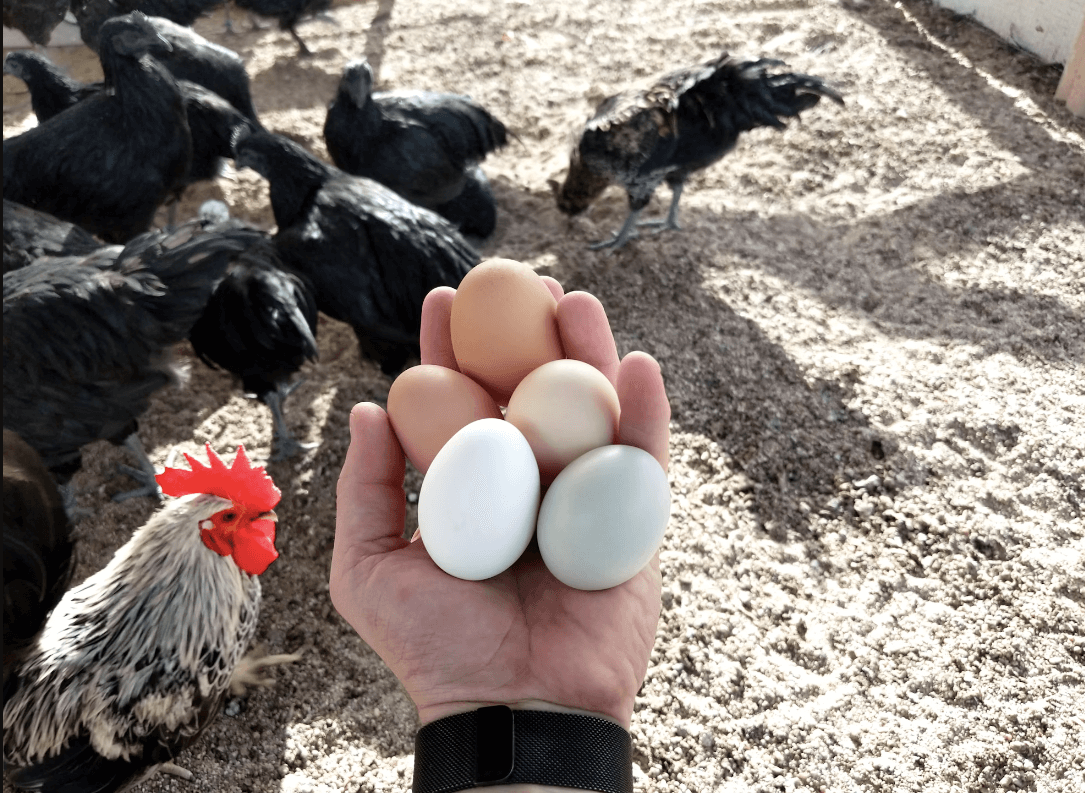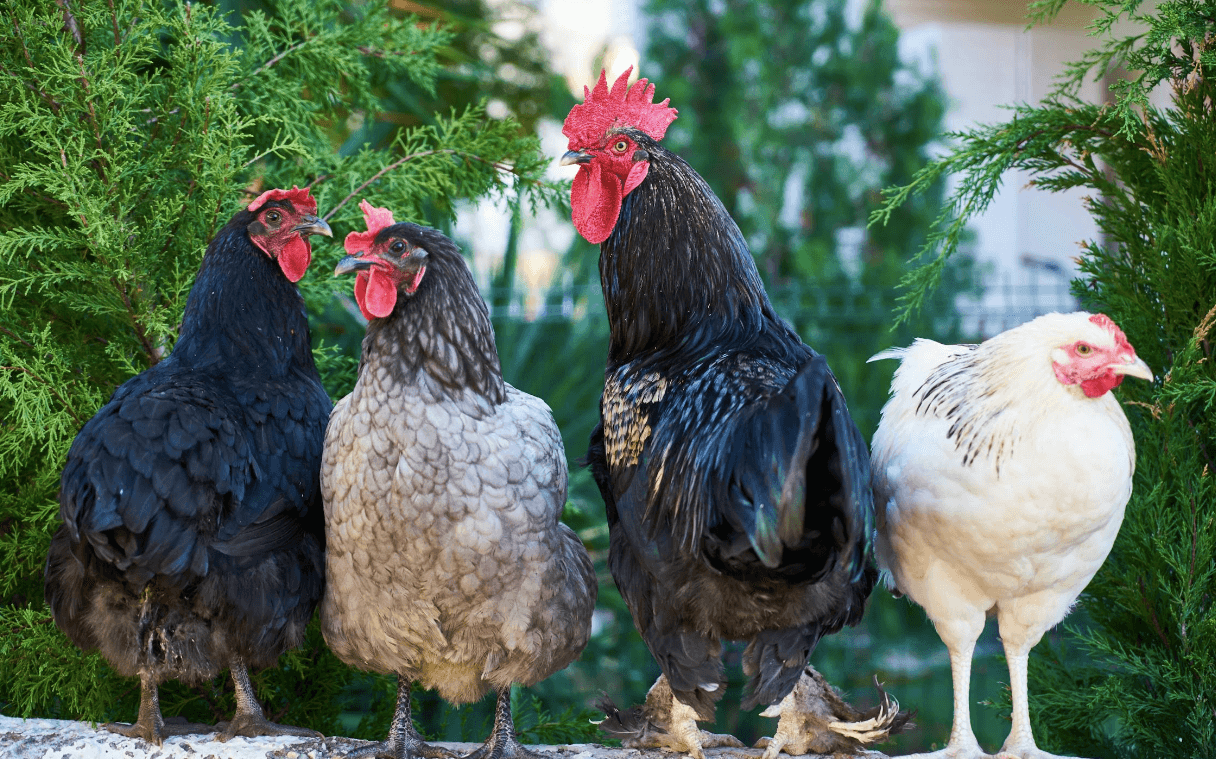It’s the dead of winter, and when visiting your chicken coop to collect the day’s eggs, you discover that they’re frozen. It’s not surprising as it’s likely that they’ve been sitting in sub-zero temperatures for a few hours.
Eggs contain plenty of water but are also packed with dissolved solids like proteins, fats, vitamins, and minerals. These components lower the freezing point of the egg, and as a result, they become solid at temperatures of around 31ºF.
Is there anything you can do with eggs that have frozen and are they safe to eat? We’ll answer these questions and more in this guide, along with giving you some advice on how to prevent your eggs from freezing in the future.
We’ll also provide you with some tips on how to safely freeze any extra eggs you may have for later use to ensure all your hens’ hard work doesn’t go to waste.
Let’s get cracking.
Are Eggs That Have Frozen in the Coop Safe to Eat?
Yes, it’s safe to eat eggs that have frozen in your chicken coop as long as they meet one requirement—they mustn’t have any cracks in their shells.
Freezing causes the egg’s yolk and white to expand, placing pressure on its hard outer layer. This often damages the shell and can also disrupt the flexible inner membrane.
These cracks provide a pathway for any bacteria present on the shell to enter the egg, increasing your chances of getting sick should you eat it. As a result, your safest bet is to toss out any frozen eggs that have cracks in their shells.
If you’re uncertain about whether or not your eggs are cracked, leave them in a bowl in your refrigerator for a few hours. Should the whites begin to leak out as they defrost, the shells are damaged and you should throw them away.
Frozen eggs without cracks can safely be used, but keep in mind that you won’t be able to cook with them in the same ways as unfrozen eggs.
The process of solidifying causes the yolk to become thick and syrupy, and it doesn’t flow or blend as well with the egg white or other ingredients. You’ll be able to hard cook frozen eggs with ease, but avoid using them in trickier recipes like soufflés.
How to Handle Frozen Chicken Eggs
Once you’ve taken your frozen, uncracked eggs out of the coop, immediately place them in the refrigerator to thaw slowly overnight. They will be perfectly safe to eat once they’ve defrosted completely.
If you’re in a hurry and need your eggs to thaw more urgently, immerse them in a bowl of warm tap water, replacing it every 30 minutes until the eggs are completely defrosted. A thawed egg won’t be cold to the touch and may feel slightly heavier than a frozen one.
We don’t recommend using a microwave to thaw your frozen eggs, as it could lead to uneven defrosting and potentially cook the egg in some spots.
Once your eggs are thawed, keep them in your fridge and use them within a few days to maintain their freshness.
It’s crucial to never leave frozen eggs at room temperature. This will cause condensation on the shell, which removes the bloom of the egg and allows air and bacteria to enter it.
Here’s a quick recap of the methods you can use to thaw frozen chicken eggs:
How to Prevent Your Eggs From Freezing
With a few precautions and some good planning, you can prevent your eggs from freezing in your coop. Let’s take a look at some of the steps you can take to ensure the safety and quality of this precious commodity during the colder months.
1. Collect Your Eggs Regularly
One of the best ways to prevent your eggs from freezing is to venture out into your coop as often as possible to collect them.
The temperature of a freshly laid egg is around 100ºF, so you’ll have some time before it’s at risk from the cold. Aim to visit your coop every 3–4 hours to gather eggs before they have the chance to cool down and approach freezing point.
We know this seems like a big commitment, but you’ll only have to do this during sub-zero conditions.
2. Insulate Your Nesting Boxes
If you’re unable to check your coop every few hours, your next best course of action is to insulate your nesting boxes to keep your eggs warm for longer.
Insulated nesting boxes help a hen maintain her body heat, extending the viability of the eggs and keeping the chicken cozy.
An easy option is to use a thick layer of straw as bedding. Straw is a wonderful insulator as it traps air in its shaft, providing warm surroundings for eggs and preventing them from reaching freezing temperatures.
Our natural excelsior aspen fiber nesting pads are also excellent for insulation. They provide a soft, clean, and warm space for your hens while regulating the temperature within the nesting box.
Another way to provide insulation for your hens is to hang curtains over the entrances of your nesting boxes. They help to retain heat and also provide your birds with some privacy while they’re busy laying eggs.
You don’t need to purchase anything fancy. Something simple like a feed bag or burlap sack stapled over the front of the box will do the job.
3. Insulate Your Chicken Coop
Insulating your chicken coop is another important step that helps prevent your eggs from solidifying in the winter. Proper insulation maintains a stable temperature inside the enclosure, preventing eggs from exposure to freezing conditions.
Add some straw bales to the outside of the coop to keep drafts and cold air out. They act as a barrier, blocking wind and retaining heat inside, creating a more comfortable environment for your cluckers.
Wrapping the coop in a plastic tarp also helps to keep it a little warmer, but ensure there is still adequate ventilation for the health of your flock.
Inspect your hen house for any cracks, gaps, or openings where cold air could enter. Seal these areas with caulk or a foam sealant as an extra step to create a more airtight environment.
4. Consider Heating Your Coop
In extremely cold climates, consider adding a heat source to your coop to provide additional warmth.
Hanging a heating panel above your nesting boxes is the surest way to keep eggs warm and maintain a constant temperature in the area. Radiant panels provide gentle and uniform heat while being energy-efficient and safe to use in chicken coops.
Our chicken coop heater evenly distributes warmth without creating hotspots or fluctuations in temperature. It is a much safer option than heat lamps, which often come with the risk of fire and could cause injury to your birds due to their exposed heating elements.
Intentionally Freezing Eggs for Later Use
There may come a time when your chicken coop provides you with more eggs than you can use. While giving them away to friends and neighbors is a great option, it’s also possible to freeze any extras yourself to use at a later stage.
This can be done safely as long as you follow a few simple rules.
The United States Department of Agriculture states that you should never freeze eggs in their shells. To get around this, crack the eggs into individual spaces on an ice cube tray or muffin pan. Add a little salt and beat the eggs together before placing the tray into your freezer for a few hours.
This method gives the eggs the space to expand during the solidifying process without the risk of breaking their shells.
Once frozen, the eggs can be taken out of the tray and placed into labeled Ziploc bags, where they should last in your freezer for up to a year.
Beat the Big Egg Freeze
All is not lost should your eggs freeze in your chicken coop. Toss the cracked ones out and defrost the rest for safe use in your cooking. They still offer the same delicious taste and nutritional benefits as unfrozen eggs once properly thawed.
With proper precautions and some proactive measures, it’s also possible to beat the freeze and prevent your eggs from solidifying during the winter months.
By implementing the strategies in this guide, you can enjoy a steady supply of fresh, delicious eggs year-round, even in the coldest months.





